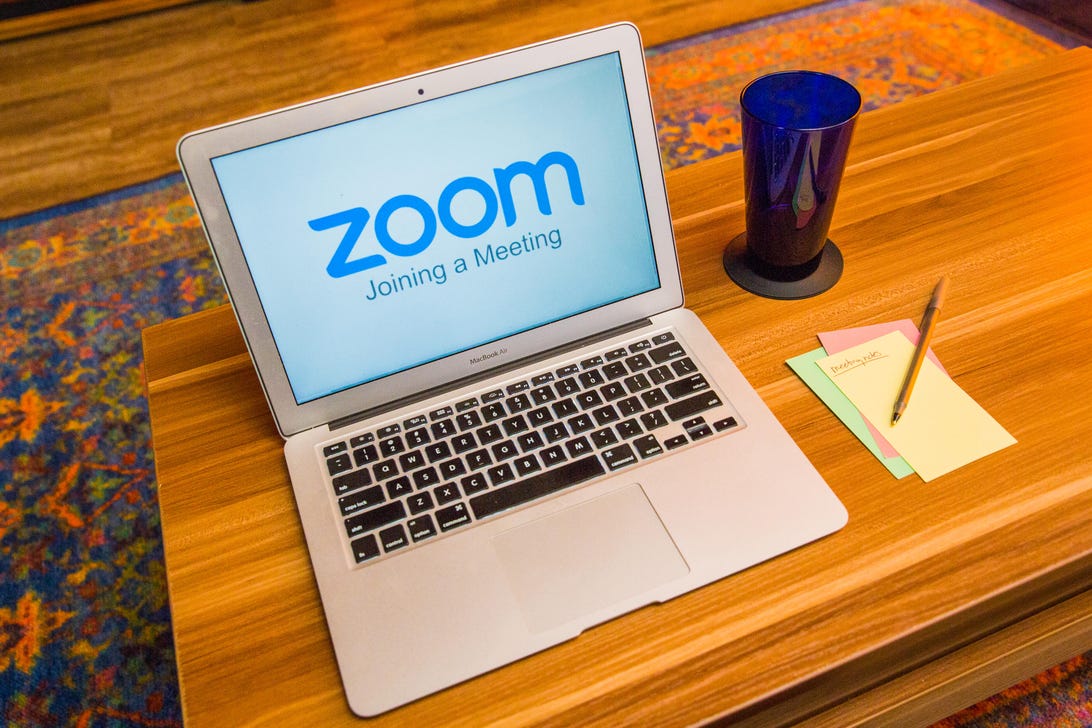Why Is Upload Speed Higher Than Download

Yous know your upload speed is poor if your Zoom meetings stall or freeze.
Sarah Tew/CNETThere'south a reason well-nigh internet providers promote a plan's download speeds while treating upload speeds equally an afterthought. Downloading dominates what we use the internet for, from streaming TV and music to viewing this webpage. Consequently, net providers prioritize download speeds, ofttimes leaving customers with upload speeds that are significantly lower.
So what's upward with upload speeds? Are they every bit inconsequential as some providers would propose, or practise they play a bigger role in our connected lives than they become credit for? I'll explicate why your upload speeds are important, why they may exist ho-hum and how you lot can improve them.
Read more than:Which cyberspace speed test should you use to test your connection at abode?
What are upload speeds used for?
Upload speed determines how fast you can send, or upload, data from your computer or device to the internet. This includes uploading files, such as pictures and videos to social media or homework assignments, but upload speeds are too essential to video conferencing, VOIP calling and online gaming.
Similar to how download speeds touch motion-picture show and audio quality when streaming a testify on your TV, your upload speeds bear on how others meet and hear you on the other end of your video conference or online game. Boring or unstable upload speeds are oft the cause of awkward frozen screens and broken audio when using apps like Skype or Zoom.
What's a skillful upload speed?
When using a wired connection on a unmarried device, upload speeds of 5Mbps or higher are generally considered "good" as they will support most activities that require uploading data, including video calls in HD quality and gaming online. If you primarily apply Wi-Fi or foresee using upload bandwidth on multiple devices at once, aim for upload speeds of 10Mbps or college.
Minimum requirements for calling and video conferencing
The FCC considers any upload speed of 3Mbps or higher as "broadband." However, the FCC set this speed threshold (along with its broadband download speed of 25Mbps) back in 2015 and has since received bipartisan congressional force per unit area to raise the bar on what is officially considered broadband.
Still, the FCC standard of 3Mbps is plenty on paper, albeit non by much, to meet most of the minimum requirements for applications such as Skype and Zoom. Skype recommends a minimum of 100Kbps for calling and 512Kbps for group video chats of seven or more people. Zoom is a scrap more enervating, requiring a minimum of 600Kbps for i:i video calling and 3.8Mbps for 1080p HD video group calling.
Go on in mind that these are the minimum requirements and you're likely to do good from much faster speeds, so it'south a good idea to know what your speeds are and what can touch on them.

Why are my upload speeds so slow?
A good speed examination will requite you an idea of what your upload speeds are. Of course, if you've been experiencing excessive lagging and freezing when on video calls, yous might not need to run a speed examination to know your upload speeds are not up to par with your needs.
If your upload speeds autumn below your needs or expectations, there are a number of factors that can contribute to boring speeds.
That's just what you get
The chief culprit of slow upload speeds, especially when compared to your download speeds, is the internet program itself. Plans from almost internet service providers, with the exception of fiber internet service, typically come with max upload speeds around a 10th or less of their advertised download speeds. If yous sign up for an internet programme with max download speeds of 50Mbps, you tin likely expect peak upload speeds of 5Mbps or less.
Most cable internet providers, including Cox, Spectrum and Xfinity, take max upload speeds of 30 to 35Mbps, even though gigabit download speeds are often available. The same goes for most DSL and satellite net services; upload speeds are far lower than the advertised download speeds.
How to fix it: The best thing y'all can do is observe out what the available max upload speeds are with a particular provider or programme before signing upwardly. Most providers will list upload speeds on their website, only you may have to expect through the fine impress or plan details to observe it.
If you already have internet service, you may want to consider upgrading to a faster program. You'll likely non only get faster upload speeds just also a nice boost in download speeds. Switching providers is also an choice, peculiarly if fiber optic service from providers such as AT&T, CenturyLink, Google Fiber or Verizon Fios are available. Fiber technology supports the bandwidth required for symmetrical or near-symmetrical download and upload speeds. And then if you sign upwards for a 300Mbps program, you can expect download and upload speeds of around 300Mbps over a wired connection.
All of the new routers appear at CES 2021 -- including next-gen Wi-Fi 6E
See all photosWi-Fi is always slower
Wi-Fi is an culling to a wired connectedness, not its own separate internet service. If you apply a Wi-Fi connection, expect download and upload speeds to be half or less than your program's max advertised speeds, which are intended for a wired connection.
Range and obstructions can be issues when using Wi-Fi also. The farther y'all move away from your router, or if you motility to a unlike room or floor, the lower your upload speeds are likely to be.
How to set up it: Using a wired Ethernet connection will nearly e'er requite you a faster, more than reliable connexion. Effort using a wired connection if you need fast, stable upload speeds for an important meeting or school project.
A wired connectedness isn't always applied and Wi-Fi is much more convenient, so there will oft be times when Wi-Fi is your but option. There are a number of ways to amend your Wi-Fi connection, such as elevating your router or repositioning the antennas.
An equipment upgrade is too an effective way to improve your Wi-Fi speeds. If you're not certain where to first with purchasing a new router, see our list of the best Wi-Fi routers. And for better whole-dwelling Wi-Fi connectivity, consider upgrading to a dual-band mesh router system.
Multiple upload tasks are agile at the same fourth dimension
There's only so much bandwidth available. When you accept multiple video conferences going at once, they may all exist competing with i another, bringing down anybody's available upload speeds. While simultaneous meetings or class participation can be unavoidable, endeavour to stagger meetings and limit the number of connected devices whenever possible.
How to fix it: Aside from strategically scheduling meeting times to accommodate anybody in your household, brand sure your router is gear up to broadcast two.4GHz and 5GHz bands. There's likely to exist less clutter on your 5GHz band, allowing for better connection quality and faster upload speeds.
Additionally, upgrading your internet plan or provider to one with faster max upload speeds volition help ensure there is enough to go around.
You've reached your monthly data cap
Believe it or not, uploading files and participating in video calls contribute to your monthly information usage but the aforementioned as downloading files or streaming TV. Depending on your provider, exceeding your data limit tin issue in throttled speeds for the residuum of your billing wheel.
This is likely to just be an event if you accept satellite internet. HughesNet and Viasat will drastically reduce speeds once a client has surpassed their monthly data allowance. Select DSL and cablevision net providers may also have data caps, simply most will charge an overage fee instead of throttling your speeds.
How you lot can fix information technology: If you have a monthly data cap, it's best to monitor your activity throughout the billing cycle to avoid going over. Most providers have an app and/or website that lets you proceed track of your data usage.
HughesNet customers can purchase additional data in three, 5, 10 or 25GB blocks, which volition restore their speeds until the next billing cycle or the extra information is used. Viasat does non offering additional data packets for purchase, but Viasat plans are likely to come with more data that similarly priced HughesNet plans.
Of course, your best option is to choose an cyberspace provider with no data cap, or at least one that won't throttle your speeds for going over your limit. You'll still want to keep an center on your data usage, however, as excessive data use could violate your service term agreement, which may result in service interruption.
Looking for more ways to improve your internet connection? Visit the CNET internet hub folio for more articles featuring all things related to your home internet service.
arnoldshoubless60.blogspot.com
Source: https://www.cnet.com/home/internet/upload-speeds-explained/
0 Response to "Why Is Upload Speed Higher Than Download"
Post a Comment